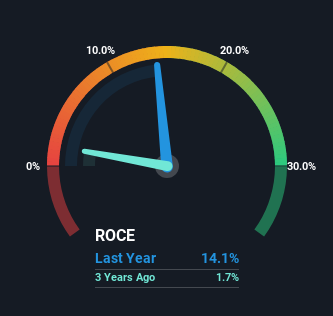- United Kingdom
- /
- Airlines
- /
- LSE:IAG
The Returns On Capital At International Consolidated Airlines Group (LON:IAG) Don't Inspire Confidence

If we want to find a potential multi-bagger, often there are underlying trends that can provide clues. In a perfect world, we'd like to see a company investing more capital into its business and ideally the returns earned from that capital are also increasing. Basically this means that a company has profitable initiatives that it can continue to reinvest in, which is a trait of a compounding machine. In light of that, when we looked at International Consolidated Airlines Group (LON:IAG) and its ROCE trend, we weren't exactly thrilled.
Return On Capital Employed (ROCE): What Is It?
For those that aren't sure what ROCE is, it measures the amount of pre-tax profits a company can generate from the capital employed in its business. The formula for this calculation on International Consolidated Airlines Group is:
Return on Capital Employed = Earnings Before Interest and Tax (EBIT) ÷ (Total Assets - Current Liabilities)
0.14 = €3.1b ÷ (€43b - €21b) (Based on the trailing twelve months to June 2023).
So, International Consolidated Airlines Group has an ROCE of 14%. That's a relatively normal return on capital, and it's around the 13% generated by the Airlines industry.
View our latest analysis for International Consolidated Airlines Group

In the above chart we have measured International Consolidated Airlines Group's prior ROCE against its prior performance, but the future is arguably more important. If you'd like, you can check out the forecasts from the analysts covering International Consolidated Airlines Group here for free.
The Trend Of ROCE
On the surface, the trend of ROCE at International Consolidated Airlines Group doesn't inspire confidence. To be more specific, ROCE has fallen from 18% over the last five years. However, given capital employed and revenue have both increased it appears that the business is currently pursuing growth, at the consequence of short term returns. If these investments prove successful, this can bode very well for long term stock performance.
On a separate but related note, it's important to know that International Consolidated Airlines Group has a current liabilities to total assets ratio of 49%, which we'd consider pretty high. This can bring about some risks because the company is basically operating with a rather large reliance on its suppliers or other sorts of short-term creditors. While it's not necessarily a bad thing, it can be beneficial if this ratio is lower.
The Key Takeaway
In summary, despite lower returns in the short term, we're encouraged to see that International Consolidated Airlines Group is reinvesting for growth and has higher sales as a result. These growth trends haven't led to growth returns though, since the stock has fallen 58% over the last five years. As a result, we'd recommend researching this stock further to uncover what other fundamentals of the business can show us.
International Consolidated Airlines Group could be trading at an attractive price in other respects, so you might find our free intrinsic value estimation on our platform quite valuable.
While International Consolidated Airlines Group isn't earning the highest return, check out this free list of companies that are earning high returns on equity with solid balance sheets.
New: AI Stock Screener & Alerts
Our new AI Stock Screener scans the market every day to uncover opportunities.
• Dividend Powerhouses (3%+ Yield)
• Undervalued Small Caps with Insider Buying
• High growth Tech and AI Companies
Or build your own from over 50 metrics.
Have feedback on this article? Concerned about the content? Get in touch with us directly. Alternatively, email editorial-team (at) simplywallst.com.
This article by Simply Wall St is general in nature. We provide commentary based on historical data and analyst forecasts only using an unbiased methodology and our articles are not intended to be financial advice. It does not constitute a recommendation to buy or sell any stock, and does not take account of your objectives, or your financial situation. We aim to bring you long-term focused analysis driven by fundamental data. Note that our analysis may not factor in the latest price-sensitive company announcements or qualitative material. Simply Wall St has no position in any stocks mentioned.
About LSE:IAG
International Consolidated Airlines Group
Engages in the provision of passenger and cargo transportation services in the United Kingdom, Spain, the United States, and rest of the world.
Undervalued with proven track record.


